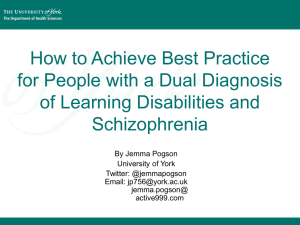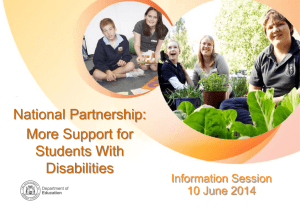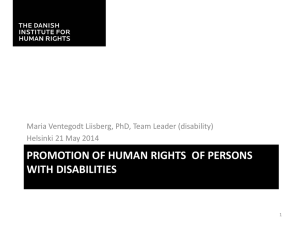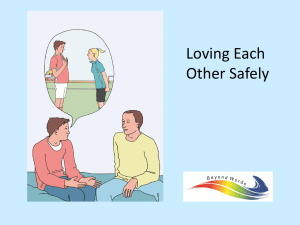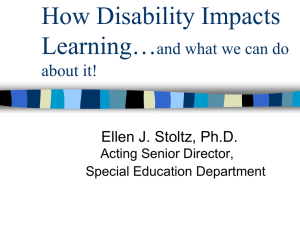HIV and disability: taking stock of the advocacy, CIP
advertisement
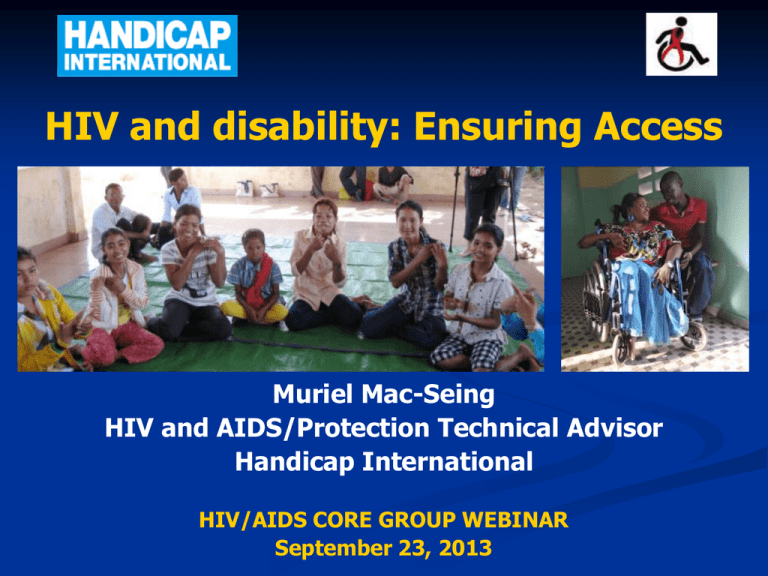
HIV and disability: Ensuring Access Muriel Mac-Seing HIV and AIDS/Protection Technical Advisor Handicap International HIV/AIDS CORE GROUP WEBINAR September 23, 2013 For the first time in UNAIDS’ Strategy 2011-2015… “When social support and other programmes for persons with disabilities are delivered in an HIV-sensitive manner, they contribute to overcoming the historic neglect of HIV prevention and support to persons with disabilities.” What do we know so far and always wanted to know more about HIV and disability? (5 min brainstorming) Outline of presentation Key facts What is disability Intersection between HIV and disability Handicap International (HI)’s experience in HIV and AIDS for people with disabilities Good practices and lessons learned from HI Some challenges International tools and national policies Opportunities and ways forwards Online resources on HIV and disability Some facts 15% of the world’s population lives with a disability (19% among female population); 2-3% lives with severe disabilities (WHO/WB, 2011) 5-10% of all children in Africa grow up with disabilities (UNICEF, 2013) People with disabilities make up 20% of the poorest in the world (UN, 2011) The prevalence of violence against people with disabilities is 1.3 times higher than that in the general population (Lancet, 2012) Children with disabilities are 3.7 times more affected by all forms of violence than their non-disabled peers (Lancet, 2012) Some facts (continued) People with physical, intellectual, mental or sensory disabilities are as likely, if not more likely, to be at risk of HIV infection (Groce, 2004; UNAIDS/WHO/OHCHR, 2009) Women and girls with disabilities in particular are often at increased risk of HIV as a result of their increased exposure to sexual violence (Enarson, 2009) Few available HIV prevalence studies among people with disabilities show similar or higher prevalence than national averages in South Africa, Kenya, Cameroon and Senegal (IDDC, 2012) PLHIV are also at risk of developing disabilities on a permanent or episodic basis as a result of their illness and/or side effects of ARV (Hanass-Hancock & Nixon, 2010; O’Brien et al, 2008) What is disability? The medical model historically focuses on the dysfunction or impairment of the individual The social model of disability asserts that the impairment itself is not an obstacle for the disabled individual, but is a socially-created problem and demands a political and social response Convention on the Rights of Persons with Disabilities (2007): “… disability is an evolving concept and results from the interaction between persons with impairments and attitudinal and environmental barriers that hinders their full and effective participation in society on an equal basis with others ...” The ICF as a model of disability (WHO, 2001) HIV and ART seen under the ICF HIV as a health condition Impairments e.g. blindness caused through TB treatment Activity limitation e.g. not able to see and read Environment e.g. no life skills or workplace adjustment Participation restriction e.g. exclusion from work, stigma Personal Factors e.g. depression, gender, hope Why people with disabilities are at risk to HIV and AIDS? Lack of access to education in particular sexuality/sexual health education Increased risk to sexual violence and exploitation Potential of increased risk behaviors Lack of access to inclusive health products and services Increased likelihood of living in poverty Stigma (disability, gender and HIV), misconceptions and negative attitudes from family, community and society Lack of application of national laws and policies supposed to protect and promote rights Lack of knowledge/skills from service providers HIV prevalence among at-risk populations in South Africa, 2008 35 30 25 20 15 10 5 0 African African males +50 females (20- males (2534) 49) MSM High-risk Recreational People with drinkers drug users disabilities average Source: South African National HIV Prevalence, Incidence, Behaviour and Communication Survey, 2008 Interrelationship between HIV and AIDS and disability People with disabilities Lack of access to education especially sexuality/sexual health education Lack of access to HIV information and services Increased risk to sexual violence and less access to justice Negative attitudes from service providers Stigma and discrimination (disability, gender and HIV) PLHIV developing epidosic and/or chronic disabilities Mental health disorders: depression, schizophrenia, anxiety, substance abuse Impairments such as neurocognitive impairments, blindness, deafness, peripheral neuropathy, etc. Episodic disabilities People who care for PLHIV (old or young) AIDS related activities limitation associated with increased child healthcare task, decreased school attendance in children, food insecurity and educational outcomes Hanass-Hancock & Nixon, 2009; HEARD and Handicap International, Durban, 2013 Handicap International Established in 1982, a federation composed of eight national associations (France, Belgium, Switzerland, Luxembourg, Germany, UK, USA and Canada) Present in 60 countries worldwide Working in disability rights, support to disabled people’s organizations, prevention & health, physical rehabilitation, social inclusion (livelihoods and education), anti-mine action and emergency Co-recipient of the 1997 Peace Nobel Prize as a co-founder of the International Campaign to Ban Landmines (ICBL) Recipient of the 2011 Hilton Humanitarian Prize HI’s experience in HIV and disability Twin-track approach for disability inclusion used by HI in HIV and AIDS Handicap International and DfID, Disability, Poverty and Development, Feb, 2000, page 11. ...Also based on HI’s guide on access to services for people with disabilities.... Handicap International (2010). Access to services for persons with disabilities: Practical guide, page 19. ...And a disability inclusive and HIV programming integrated to SRH and GBV.... Handicap International (2012). Inclusive and integrated HIV programming: Policy Paper. What to keep of the African Campaign on Disability and HIV and AIDS Co-founded by the Secretariat of the African Decade for Disabled Persons (1999-2009) and Handicap International in 2006 An unifying umbrella composed of disabled people’s organisations (DPOs), organisations of PLHIV, NGOs, AIDS organisations, WHO, researchers and activists Launch of the Campaign in 2007 in Cape Town, South Africa In 2008, the Kampala Declaration on Disability and HIV and AIDS was adopted and disseminated at ICASA Dakar 2008 in French, English and Portuguese After 2008-2009, many countries which were involved in the African Campaign decided to “nationalize” the Campaign at the country level, e.g. South Africa, Kenya, Uganda and Mozambique Steering Committee of Campaign dissolved in 2010/2011 to allow full ownership of various countries who have decided to work on disability and HIV at national level Good practices and lessons learned from HI on HIV and disability In Senegal: good practice at national policy level for including people with disabilities in the National AIDS Strategic Plan In Kenya: good practice at HIV counselling and testing level through adaptation of methodologies for increased uptake of HIV services among people with visual and hearing impairments In Rwanda: good practice at Disabled People’s Organizations (DPO) level through organizational development leading to resource mobilisation In Ethiopia: good practice at building the capacity of mainstream AIDS organizations/services providers on disability inclusion In Cambodia: good practice at an individual level through a tailored initiative for rural deaf women on HIV prevention and sexual violence protection In Senegal Part of a regional HIV and disability project (with Mali and Burundi) Implemented in 2008-2011 Funded by the French Development Agency and USAID Senegal National platform on HIV and disability to advocate the inclusion of disability in AIDS programming and policies Adaptation of IEC material Capacity building of services providers (VCT level) Micro-projects on accessibility between VCT centres and DPOs Behavioral and epidemiological study among people with disabilities in Dakar region (1.18% versus 0.7% of HIV prevalence at national level in 2011) oral presentation of results at ICASA 2011 Inclusion of people with disabilities in key populations in the current NSP, with clear references to human rights, HIV prevention and allocation of budget In Kenya HIV prevention for people with hearing and visual impairments Implemented in 2012-2013 Funded by the Kenyan Government/WB Awareness-raising and mass media campaign Adaptation of IEC/BCC material in accessible format (large prints, Braille, education documentary DVD with Kenyan sign language) Inclusion of people with different impairments in design and monitoring of adapted IEC material Training of disabled peers to become peer educators support and prevention Promotion of uptake of accessible VCT services In Rwanda HIV and disability project with integration with SGBV services Implemented in 2008-2013 Funded by the Health Resources and Services Administration/USG Organizational development of DPOs and CBOs as a result 2 DPOs financed by the Global Funds on HIV and AIDS Adaptation of IEC/BCC material (cross-impairments) Capacity building of disabled people to become peer educators/support Reasonable physical accommodation in VCT centres Training of health/HIV service providers in sign language and on disability inclusion Work with the MoH on disability inclusion and data disaggregation information in VCT registries ownership and inclusion of disability in new NSP SGBV assessment of the situation of people with disabilities: http://www.hiproweb.org/uploads/tx_hidrtdocs/RwandaSDRS05.pdf Capitalisation document of good practices on disability inclusion: http://www.hiproweb.org/uploads/tx_hidrtdocs/HILessons_Learned_Collection_Strengthening _communities_to_integrate_persons_with_disabilities.pdf In Ethiopia Mainstreaming of disability in PEPFAR/USAID funded mainstream AIDS organizations (PSI, PC, Intrahealth, JHU, Addis Ababa University and the National AIDS Resource Centre) Implemented in 2010-2013 Funded by World Learning/USAID Disability accessibility audit, disability focal points TOT training on disability inclusion in HIV and SRH for health professionals Disability accessibility action plan for health structures (adaptation of IEC material, sign language for VCT counsellors, physical accessibility) Capacity building of service providers, relevant local authorities, media, architects/engineers Coaching and ongoing technical assistance/support to partners KAP surveys among people with disabilities in Addis Ababa Advocacy and sensitization during ICASA 2011 In Cambodia HIV prevention and sexual violence protection for people with disabilities, especially deaf women in rural areas of Cambodia Implemented in 2008-2012 Funded by the French Development Agency Mapping of people with different impairments in target areas Quantitative (KAP) and qualitative (vulnerability) assessment Awareness-raising and HIV/SRH/GBV education and prevention Development of Cambodian signs on HIV/sexual violence with the Deaf-Development-Program (DDP) Cambodian sign language training to deaf women in their villages Establishment of support groups for people with disabilities Capacity building to and work with target Commune Councils to include disability into the commune development action plan Linkages to health care services and GBV multisectoral services (psychosocial, medical and police/legal) Examples of accessible products/services Examples of accessible products and facilities Some key challenges.... Still not enough evidence creation such as HIV prevalence studies among people with disabilities lack of comprehensive national data on HIV and AIDS and disability Though numerous funding for “vulnerable groups” and progressive increase of funding focusing on disability, still limited donors’ prioritization on this largest world minorities (around one billion people) Scaling up of disability inclusive approach and initiatives in HIV/SRH programming Limited partnership between AIDS and disability-focused organizations/disabled people’s organizations How to take advantage of provision of international tools and national policies? UN Convention on the Rights of Persons with Disabilities (CRPD) (2007) biding international tool (article 9 on accessibility and 25 on health (including HIV/SRH) WHO/UNFPA Guidance on promoting SRH for persons with disabilities (2009) UNAIDS/WHO/OHCHR Policy Brief on Disability and HIV (2009) WHO/WB World Report on Disability (2011) how to not miss 1 billion people! UN HLM Declaration with specific references on disability/people with disabilities (2011) How to take advantage of provision of international tools and national policies? HEARD/HI et al. Framework on the inclusion of disability in NSPs (2011) UNAIDS Investment Framework (2011) know your epidemic (people with disabilities are there!) UNAIDS Issues Brief on a Strategy on HIV and disability (2012, under revision) Capitalize on the HLM on disability and development (Sept 23, 2013) and related discussions, position papers, resolutions ... And all countries which have ratified the UN CRPD!! Opportunities and ways forwards Support mechanisms for disability-related data collection in HIV and AIDS as part of the national M&E system (epidemiological and behavioral information) Support the inclusion of disability in national AIDS strategic frameworks and plans Assist disabled people’s organizations (DPOs) to be part of national AIDS committees Ensure signification participation of people with disabilities in decision-making processes, implementation and M&E Promote gender equality and disability inclusion Opportunities and ways forwards Strengthen/facilitate networking/partnership between HIV and disability at international, national and grass-roots levels Capacity building/technical assistance of mainstream AIDS organizations on disability inclusion Bridge the gaps between academics/researchers, disability activities and ground practitioners Support and monitoring of the application of the UN CRPD and national laws and policies Engage the private sector in AIDS and disability Online resources on HIV and disability Handicap International « Ask Source » resources site: http://www.asksource.info HEARD Resource Centre: http://www.heard.org.za/african-leadership/disability Canadian Working Group on HIV and Rehabilitation: http://www.hivandrehab.ca/EN/index.php UNAIDS: http://data.unaids.org/Publications/IRCpub07/jc1252-internguidelines_en.pdf UN Enable: http://www.un.org/disabilities/default.asp?id=1560 Discussion period Thanks! Merci !

